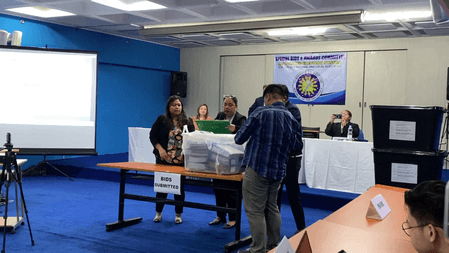SUMMARY
This is AI generated summarization, which may have errors. For context, always refer to the full article.
![[OPINION] Comelec has to reopen public bidding for automated election system in 2025](https://www.rappler.com/tachyon/2024/01/public-bidding-2025-election-January-25-2024.jpg)
By all means, the Commission on Elections (Comelec) has no choice but to reopen the public bidding to run the automated election system (AES) for the 2025 midterm elections. It should not close the public bidding with only a single participant in what could be considered a failed public bidding. It should encourage legitimate technology firms to participate in the public bidding in an election without Smartmatic, which managed the earlier automated elections.
While Miru Systems Co. Ltd of South Korea is the only firm that has submitted bids, the Special Bids and Awards Committee or SBAC confirmed that five more companies purchased bidding documents but did not submit bids. These companies include Dominion Voting Systems, which acquired documents on January 3, Indra Philippines Inc. on January 4, AMA Group Holdings Corporation on January 4, and Smartmatic or SMMT-TIM 2016 Inc. on January 5, with the latter earlier disqualified by the Comelec. (Editor’s note: Here’s what you need to know about Miru Systems, the lone bidder for the costliest 2025 election contract.)
Smartmatic’s last-minute acquisition and purchase of bidding documents raised suspicion in the local information technology community that it was bound to get the contract. The IT community surmised that Comelec would allow it to participate at the last minute with the goal that the controversial firm bags the contract.
This gives discomfort to the legitimate technology firms, because they thought that by participating in the bidding process, they would confer legitimacy to Smartmatic if ever it bags the contract in its last-minute participation. Their reluctance to participate in the public bidding yields a dilemma for the Comelec.
The AES for the 2025 midterm elections has two components: the Full Automation System with Transparency Audit/Count (FASTrAC), which deals with the actual voting and counting of votes on the precinct level; and the transmission system, which deals with the delivery of votes for counting and consolidation in a central server.
Comelec earlier decided en banc to separate the two bundles of services to ensure clean, honest, free, and open elections in 2025. The poll body has come out with terms of reference (ToR) specifying that the winning bidder would come out with the hardware and software, to ensure the technology firm would deliver in 2025.
Comelec decided to exclude the transmission system in the “bundled” FASTrAC project. Its chair George Garcia said Comelec wants to do away with the single transparency server that was used in previous elections, enabling the poll body to have a new system to transmit to all recipients without a transparency router.
According to Garcia, Comelec plans to purchase by end-March this year a new poll automation system for the 2025 midterm elections. He announced the registration of voters would start on February 12 and end on September 30 to get at least three million new voters.
It could not be said with finality if the ban, which Comelec has imposed on Smartmatic, was for real and good. Press reports on Comelec’s “ban” on Smartmatic Philippines Inc., a local unit of its London-based parent firm, would be final. All they said was that Comelec did it because Smartmatic threatens the “integrity” of future elections.
Press reports said the ban was due to a probe launched by the US Justice Department against former Comelec chair Andres Bautista for alleged corruption, conspiracy, wire fraud, and money laundering.
“Given the gravity of allegations related to bribery and compromised procurement processes, as independently determined by foreign bodies, the Commission recognizes the imminent threat to the strength and integrity of our democratic processes,” the Comelec said in a statement. “Smartmatic Philippines Inc. is disqualified and disallowed from participating in any public bidding process for elections.”
Smartmatic said in a statement that the Comelec ruling has no basis and it “unjustly besmirched” its reputation, as the company itself “has not been indicted in the United States.”
“By using the non-existent indictment as a motive, Comelec did not follow the legal process to disqualify Smartmatic,” it said. Smartmatic claimed it was never given an opportunity to present its side of the controversy.
Comelec said the ban did not mean the integrity of the 2016 and 2022 presidential elections, for which Smartmatic won contracts for vote-counting machines and services, were compromised to favor certain candidates. Bautista, who denied the allegations, awarded Smartmatic a $199-million contract to supply the Philippines with 94,000 voting machines for the 2016 presidential election won by Rodrigo Duterte.
The Comelec ruling said US prosecutors accused Bautista, Comelec chair between 2015-2017, of “receiving bribes in exchange for awarding a contract for election machines to Smartmatic Corp” and for having “laundered the bribe money through multiple entities.” US prosecutors sought the Philippine government’s aid to obtain official Comelec records as part of efforts to build the case against Bautista and others, it said.
Bautista earlier said he “did not ask for nor receive any bribe money from Smartmatic or any other entity.” Bautista earlier claimed the 2016 elections that he presided over had been “hailed by various independent national and local election stakeholders as the best managed in our electoral history.” He did not elaborate.
On the other side, Miru Systems’s track record has been fraught with questions about its ability to deliver free, honest, open, and clean elections. Civil society organizations with local, regional, and global constituencies have raised serious allegations of its inability to meet obligations in nations, where Miru Systems was contracted to provide automated election systems.
In Iraq, where it was contracted in 2018 to assist in the May parliamentary elections, Miru Systems encountered difficulties that prompted Iraq’s Parliament to order a full recount of the election results. It was widely reported in the global media that Miru System’s voting machines yielded disparate results to show a failure of elections.
In another instance, the Argentinian government refused to adopt Miru System’s because of what the former considered security vulnerabilities in its “single ballot system.” Buenos Aires did not allow the Miru System to participate in its elections.
The December 2023 elections in Congo were cited as another instance of Miru System’s failure to provide adequate services to ensure open and free automated elections. Its voting machines conked out in the middle of elections triggering security issues that delayed elections in several areas in Congo, it was reported.
For its part, Comelec did not declare Miru Systems as winner of the public bidding. It said the Korean firm as “eligible,” a word which escapes definition. The poll body did not make it clear if that means Miru System is eligible for a new bidding. Neither did Comelec say it is eligible to tackle the adoption of an automated election system for the 2025 elections.
It is a word that could be interpreted in many ways. Besides, a public bidding with a single bidder is no public bidding. It requires the participation of several firms to describe it as a successful public bidding. Meanwhile, other technology firms are waiting for a final word from Comelec on Smartmatic’s disqualification, and a change in the bidding rules to mean Smartmatic’s complete disqualification from the process and the adoption of more open and transparent technology to entice other technology firms to participate. – Rappler.com
Philip M. Lustre Jr is a freelance journalist. He specializes in economic and political journalism.
Add a comment
How does this make you feel?


There are no comments yet. Add your comment to start the conversation.